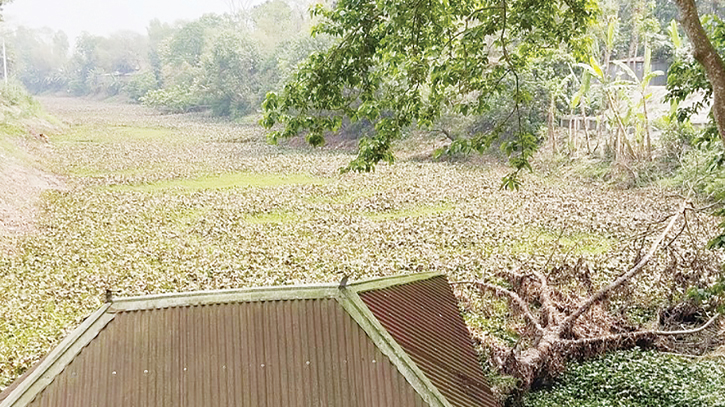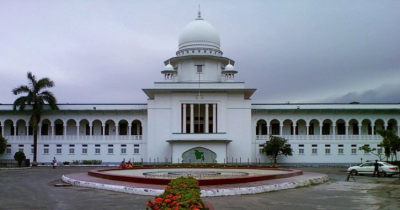
The construction of multiple permanent dams on the Ichhamati River of Manikganj, over the past century has led to its degradation, imperiling the livelihoods of residents along its 10-kilometer stretch. Photo: Messenger
The once vibrant Ichhamati River, winding through the heart of Harirampur upazila in Manikganj, now faces an existential crisis due to encroachment, pollution, and neglect.
Over the past century, the construction of multiple permanent dams has contributed significantly to its demise, threatening the livelihoods and health of hundreds of thousands of people residing along its 10-kilometer stretch.
Originally flowing from Kaliganga in the Bangabaria area of Manikganj Sadar upazila to Sultanpur, Bahulatuli, and Kanthapara of Balra union in Harirampur upazila, the Ichhamati River's trajectory has been altered by human intervention. Around the year 2000, measures were taken to mitigate erosion of the Padma River, inadvertently exacerbating the Ichhamati's plight.
Culvert bridges, embankments, and sluice gates were erected, impeding the river's flow and exacerbating waterlogging and pollution issues.
The consequences of these unplanned interventions are dire. Local residents report extreme public suffering, with garbage disposal and encroachment further degrading the river's health. During the rainy season, piles of garbage line its banks, emitting foul odors that permeate the air. As the river stagnates, the stench of rotting leaves spreads, impacting thousands of families living along its banks and rendering the water unusable.
Come winter, the riverbed lies barren as the water dries up completely, exacerbating navigability crises and further endangering the river's existence. The rich heritage of the Ichhamati is under threat, as encroachment, pollution, and neglect continue unabated. The proliferation of dams has led to a significant loss of biodiversity, affecting agriculture and fish breeding activities in the region.
Zahidur Rahman Tushar, former chairman of Boyra Union, emphasizes the urgent need for action, noting that the river's stagnant waters breed decay and foul odors. Chairman Kamal Hossain of Ramakrishnapur Union Parishad echoes these sentiments, highlighting the adverse impact on local communities, particularly in Elskar, where water shortages prevail.
In light of these pressing concerns, we urgently call upon the relevant authorities to take decisive action. Comprehensive measures, including dredging, removal of obstructions, and community engagement, are imperative to revitalize the Ichhamati River and safeguard its existence. Despite efforts to contact Executive Engineer Main Uddin of the Manikganj Water Development Board, communication remains elusive, underscoring the urgency of the situation.
The fate of the Ichhamati River hangs in the balance, but with concerted efforts and timely interventions, its revival is not only possible but essential for the well-being of communities and ecosystems reliant on its waters. Let us act swiftly to breathe new life into this vital waterway and ensure a sustainable future for generations to come.
The Ichhamati River's plight serves as a stark reminder of the urgent need for responsible stewardship of our natural resources. Beyond its immediate impact on local communities, the degradation of the Ichhamati reflects broader environmental challenges facing our planet. By prioritizing the restoration of this vital waterway, we demonstrate our commitment to environmental sustainability and the preservation of biodiversity.
Moreover, revitalizing the Ichhamati presents an opportunity to foster community resilience and promote equitable access to clean water resources. Together, let us embark on a journey towards a more sustainable future, where rivers like the Ichhamati thrive once again.
Messenger/Disha








